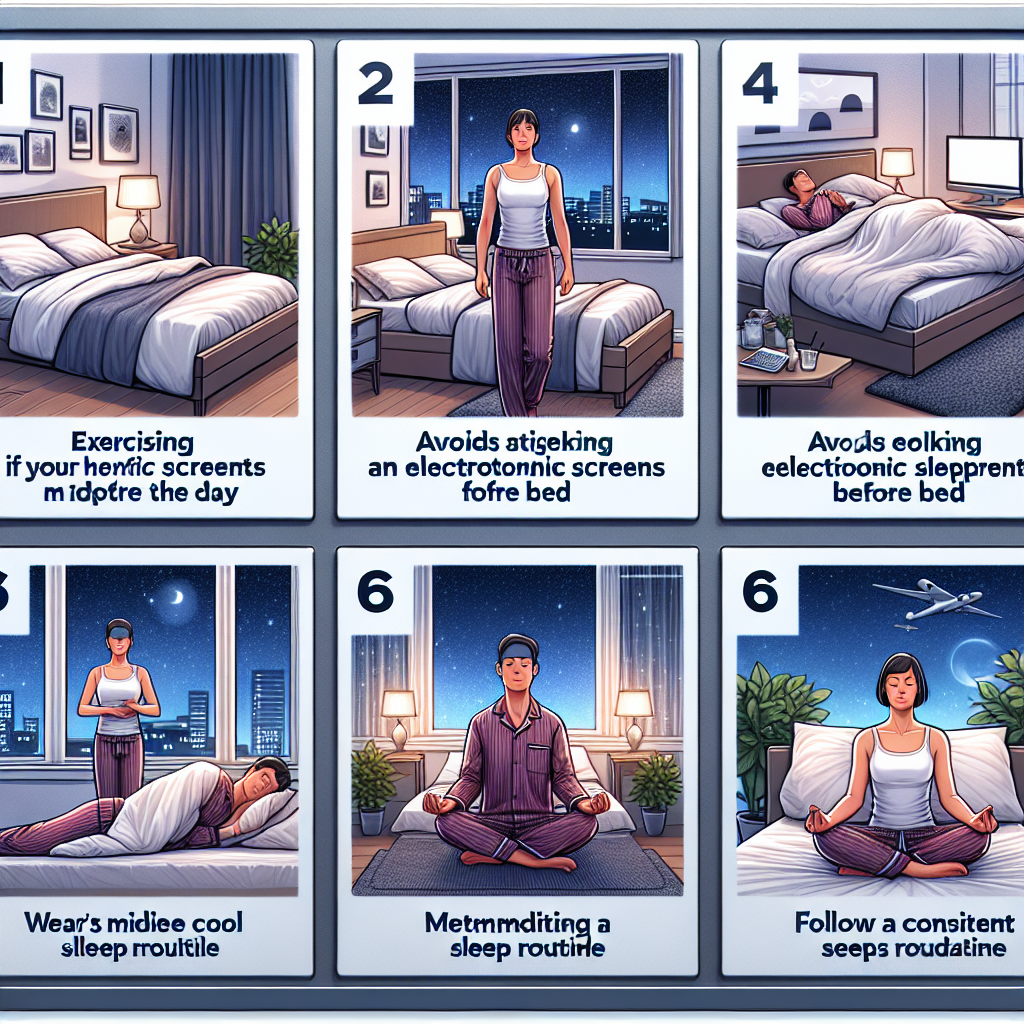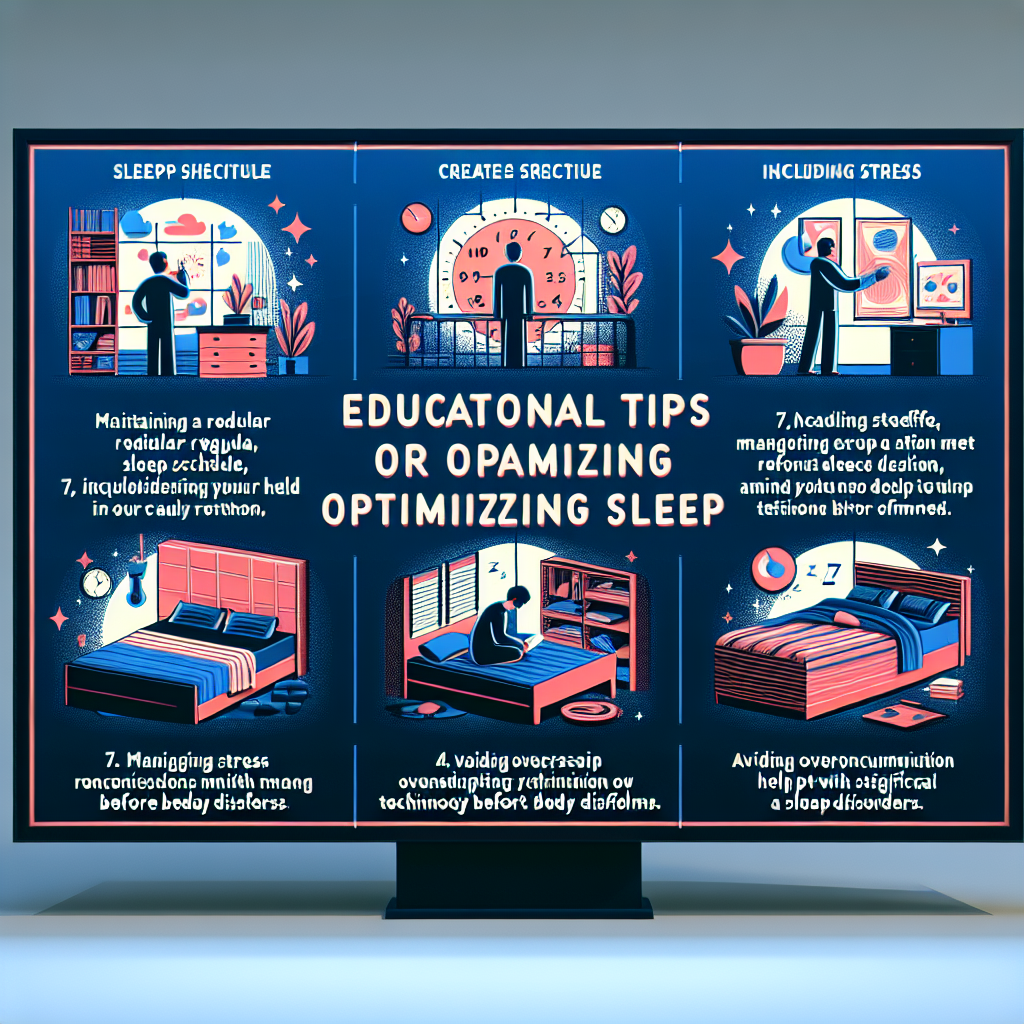7 Hacks to Optimise Sleep

Discover the 7 Hacks to Optimise Sleep today! Improve your sleep quality and wake up feeling refreshed and energized. Click here to learn more.
7 Hacks to Optimise Sleep: A Comprehensive Guide
Sleep, an essential part of our daily routine, is often overlooked in our fast-paced lives. However, it is a critical component of our overall health and well-being. A good night’s sleep can improve concentration, productivity, and even boost our immune system. Therefore, optimising sleep should be a priority for everyone. Here are seven hacks to help you achieve a better night’s sleep.
Firstly, establish a regular sleep schedule. Our bodies have an internal clock, known as the circadian rhythm, which regulates our sleep-wake cycle. By going to bed and waking up at the same time every day, we can synchronise our internal clock with our daily routine, leading to improved sleep quality.
Secondly, create a restful environment. Your bedroom should be a sanctuary for sleep. This means keeping it dark, quiet, and cool. Consider using earplugs or a white noise machine to block out disruptive noises, and invest in blackout curtains or an eye mask to keep out unwanted light. The temperature of your room also plays a significant role in sleep quality. The National Sleep Foundation recommends a bedroom temperature of around 18 degrees Celsius for optimal sleep.
Thirdly, limit exposure to screens before bedtime. The blue light emitted by phones, tablets, computers, and TVs can interfere with your circadian rhythm, tricking your brain into thinking it’s still daytime. This can make it harder to fall asleep. Try to turn off these devices at least an hour before bedtime.
Fourthly, engage in regular physical activity. Regular exercise can help you fall asleep faster and enjoy deeper sleep. However, timing is important. Try to finish exercising at least three hours before you plan to go to bed, as exercising too close to bedtime can interfere with sleep.
Fifthly, be mindful of what you eat and drink. Avoid large meals, caffeine, and alcohol close to bedtime. These can disrupt your sleep cycle and prevent you from getting a good night’s sleep. Instead, opt for a light snack if you’re hungry and stick to water or herbal tea for hydration.
Sixthly, manage stress. High levels of stress or anxiety can interfere with sleep. Consider incorporating relaxation techniques, such as meditation, deep breathing, or yoga, into your bedtime routine to help calm your mind and prepare your body for sleep.
Lastly, consider seeking professional help if you’re still struggling with sleep. If you’ve tried these tips and are still having trouble falling asleep, staying asleep, or feeling rested during the day, it may be time to consult a healthcare provider. Sleep disorders, such as insomnia or sleep apnea, are common and treatable.
In conclusion, sleep is a vital part of our health and well-being. By establishing a regular sleep schedule, creating a restful environment, limiting screen time, exercising regularly, being mindful of diet, managing stress, and seeking professional help when needed, we can optimise our sleep and reap the numerous benefits that come with a good night’s rest. Remember, quality sleep is not a luxury, but a necessity.
Unlock Better Rest: 7 Hacks to Optimise Your Sleep

Unlocking better rest is a quest that many embark on, but few truly master. The importance of a good night’s sleep cannot be overstated, as it directly impacts our physical health, mental well-being, and overall quality of life. With the hustle and bustle of modern life, achieving optimal sleep can seem like an elusive goal. However, with the right strategies, it is possible to optimise your sleep. Here are seven hacks to help you on your journey to better rest.
Firstly, establishing a consistent sleep schedule is paramount. Our bodies thrive on routine, and by going to bed and waking up at the same time every day, we can train our internal body clock to follow a regular rhythm. This consistency can significantly improve the quality of our sleep.
Secondly, creating a sleep-friendly environment is crucial. This involves making your bedroom a sanctuary for sleep. Ensure that your room is dark, quiet, and cool. Consider investing in blackout curtains, earplugs, or a white noise machine if necessary. Your mattress and pillows should be comfortable and supportive.
Thirdly, it’s essential to pay attention to what you eat and drink. Avoid large meals, caffeine, and alcohol close to bedtime. These can disrupt your sleep cycle and prevent you from falling asleep or staying asleep. Instead, opt for light, easily digestible meals in the evening and limit your intake of fluids to prevent middle-of-the-night bathroom trips.
Fourthly, regular physical activity can promote better sleep. Exercise, particularly aerobic activities, can help you fall asleep faster and enjoy deeper sleep. However, timing is important. Try to finish exercising at least three hours before you plan to retire for the night to give your body time to wind down.
Fifthly, managing stress is a key component of good sleep hygiene. High levels of stress or anxiety can interfere with your sleep. Incorporating relaxation techniques such as deep breathing, meditation, or yoga into your daily routine can help you manage stress and improve your sleep.
Sixthly, limit exposure to screens before bedtime. The blue light emitted by phones, tablets, computers, and TVs can interfere with your body’s production of melatonin, a hormone that regulates sleep. Try to turn off these devices at least an hour before bedtime to signal to your body that it’s time to sleep.
Lastly, if you’re still having trouble sleeping, don’t hesitate to seek professional help. Sleep disorders, such as insomnia or sleep apnea, are common and treatable. A healthcare provider can diagnose any underlying issues and provide appropriate treatment.
In conclusion, optimising your sleep requires a multifaceted approach that involves creating a conducive sleep environment, maintaining a regular sleep schedule, eating and drinking wisely, exercising regularly, managing stress, limiting screen time, and seeking professional help when necessary. By implementing these seven hacks, you can unlock better rest and reap the numerous benefits of a good night’s sleep. Remember, sleep is not a luxury, but a necessity for optimal health and well-being.
Revolutionise Your Slumber: 7 Hacks to Optimise Sleep
Revolutionising your slumber is not just about getting more hours of sleep, but about enhancing the quality of your sleep. Here are seven hacks to optimise your sleep and wake up feeling refreshed and rejuvenated.
Firstly, establish a regular sleep schedule. Going to bed and waking up at the same time every day, even on weekends, can help regulate your body’s internal clock, known as the circadian rhythm. This consistency can improve the quality of your sleep by ensuring you pass through all the necessary stages of the sleep cycle.
Secondly, create a restful environment. Your bedroom should be a sanctuary for sleep. It should be dark, quiet, and cool. Consider using earplugs or a white noise machine to block out disruptive sounds. Eye masks or blackout curtains can help keep your room dark. The temperature of your room also plays a significant role in how well you sleep. The National Sleep Foundation recommends a bedroom temperature of around 18 degrees Celsius for optimal sleep.
Thirdly, pay attention to what you eat and drink. Avoid large meals, caffeine, and alcohol close to bedtime. These can disrupt your sleep cycle and prevent you from reaching the deep stages of sleep. Instead, opt for a light snack or a warm, caffeine-free beverage before bed.
Fourthly, engage in regular physical activity. Regular exercise can help you fall asleep faster and enjoy deeper sleep. However, try not to exercise too close to bedtime as it might interfere with your ability to fall asleep.
Fifthly, manage your worries. Stress and anxiety can interfere with your sleep. Techniques such as meditation, deep breathing, and progressive muscle relaxation can help you relax and manage stress, promoting better sleep.
Sixthly, limit daytime naps. Long daytime naps can interfere with nighttime sleep. If you choose to nap, limit yourself to about 20 to 30 minutes and make it during the midafternoon.
Lastly, consider a sleep aid or therapy for persistent sleep problems. If you’ve tried everything and still struggle with sleep, it might be time to consult a healthcare provider. They can recommend behavioural therapy, medication, or other strategies to help you sleep better.
In conclusion, optimising your sleep is not a one-size-fits-all approach. It requires a combination of healthy lifestyle habits, a conducive sleep environment, and possibly professional help. By implementing these seven hacks, you can revolutionise your slumber, optimise your sleep, and improve your overall health and well-being. Remember, good sleep is not just about quantity but quality. So, make every hour of sleep count.